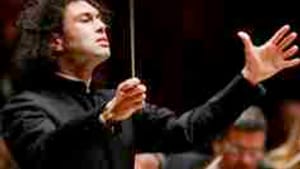Music
1978 results
Page 152

Piffaro's "Music From 17th-Century Spain'
Song and dance in Renaissance Spain
Piffaro mounts a song and dance variety show and places 17th Century Spanish music in a well-researched context.
Articles
3 minute read

When musicians won't sit still
If Horowitz could sit still, why can't Alisa Weilerstein?
Musicians today are trained not just to play but also to “perform.” But excessive movement by a performer isn't merely a visual distraction; it can impede execution as well.
Articles
3 minute read
Verdi's "La Traviata' at the Met
Tall, handsome, and he can sing, too
The Metropolitan Opera will soon retire Franco Zeffirelli's lavish production of La Traviata. The compensation is this spring's debut of the dashing tenor James Valenti. The opera world hasn't seen this combination of voice and stature since Franco Corelli.
Articles
3 minute read

New music: Three concerts
Up against six centuries of champions, or: The appealing audacity of new music
The new music played at Philadelphia concerts may or may not be the music of the future. But it can be pretty satisfying in the present, as its growing audiences attest.
Articles
5 minute read
Network For New Music plays Michael Hersch (1st review)
Our new Prince of Darkness
Michael Hersch's A Forest of Attics is complex, ferocious and disturbingly dark— in short, very refreshing at a time when ebullient tonality is all the rage. Hersch writes with an emotional honesty that leaves him naked.
Articles
3 minute read

Tempesta di Mare's "Lamentations of Jeremiah'
Reflection yes, but hold the repentance
In the hands of Tempesta di Mare, an 18th-Century Holy Week lament becomes a warm and sensual Saturday night serenade.
Articles
4 minute read

Thomas's "Hamlet' at the Met
A happier Hamlet
Hamlet, the seldom-performed opera by the 19th-Century French composer Ambrose Thomas, departs significantly from Shakespeare. Yet it works as a drama.
Articles
3 minute read

Lessons from Tilson Thomas (2nd review)
‘Are you glad you came?â€(And other questions raised by Michael Tilson Thomas)
The recent orchestral triumphs of Vladimir Jurowski and Michael Tilson Thomas offer further proof that orchestral excellence by itself doesn't suffice; audiences yearn as well for a conductor with personality.
Articles
4 minute read

San Francisco Symphony plays Mahler's Second (1st review)
Gustav in his glory
Michael Tilson Thomas, visiting Philadelphia for the first time in six years with his San Francisco Symphony, performed a Mahler Second Symphony thoughtfully conceived and transparently executed. With Mahler, attention to pacing and detail is what pays off. It did here, in one of the season's most satisfying performances.
Articles
4 minute read

Jurowski conducts the Orchestra (3rd review)
Cellos on the left (and what they tell us about Jurowski)
Vladimir Jurowski's intensity made three of the most popular works in the repertoire sound fresh and immediate. His seating arrangements may seem like a minor matter, but they tell us something important about his attitude toward his craft.
Articles
4 minute read